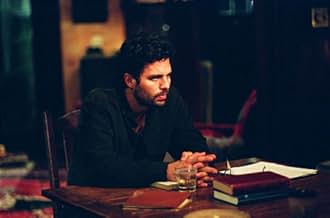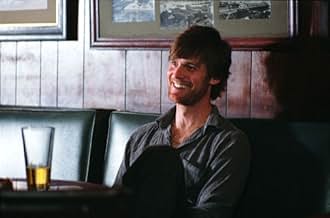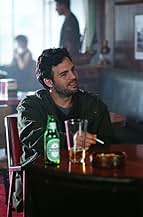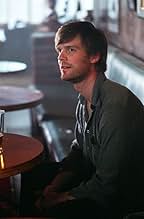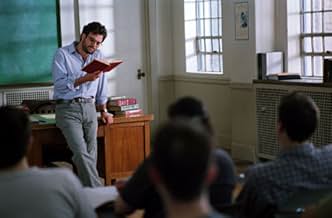CALIFICACIÓN DE IMDb
6.2/10
10 k
TU CALIFICACIÓN
Una indiscreción entre dos amigos íntimos destruye sus respectivos matrimonios.Una indiscreción entre dos amigos íntimos destruye sus respectivos matrimonios.Una indiscreción entre dos amigos íntimos destruye sus respectivos matrimonios.
- Dirección
- Guionistas
- Elenco
- Premios
- 2 premios ganados y 4 nominaciones en total
- Dirección
- Guionistas
- Todo el elenco y el equipo
- Producción, taquilla y más en IMDbPro
Opiniones destacadas
A serious and emotionally engaging melodrama that tells of two marriages, of love, friendship, adultery, faithfulness, parenting, and the delicate balance between being true to the spirit within and being responsible about the consequences in the real world.
Mark Ruffalo and Peter Krause play two college tutors of English literature, working away and also trying to get published in their own right in their spare time. They are close buddies and have loving, beautiful wives (Naomi Watts and Laura Dern). We have four 'ordinary people' who are far from caricatures they have sensitivities, intelligence, emotional aspiration and weakness as they struggle with their own stymied abilities to find happiness and fulfilment both for themselves and the ones they love.
We Don't Live Here Anymore looks at the reality of marriage in a less than rose-tinted light. The performances by Watts and Dern shine forth with increasing emotional intensity, and the efforts of their husbands to stage-manage some sort of acceptable compromise ricochet on the fringes of a dark despair that forever looms and threatens to engulf everyone. As the characters realise their increasingly complex shenanigans are verging on disaster, it leads them to ever deeper self-examination of their true feelings. And yet sometimes the children have a greater realisation of what's going on than do their parents. The film's closing scene ("Because I can") reminds us that the element of choice, true and ongoing, is so often lacking in marriage, sometimes even in relatively small things once marriage has been consummated, the rest becomes duty and infidelity is often driven by compulsion - so the elements of ongoing freewill (jointly and singly) can be hard to find.
This movie has been compared to Closer and rightly so it is for mature, thinking audiences who can come to terms with deep imperfections and use the depths of what it takes to be truly human to make things better (or find a way forward that has emotionally honesty). The 'moral right' will dismiss both films not so much out of a sense of superiority ('adultery never pays') but simply through lack of understanding.
The heavy-going nature of the film is alleviated by shots of rare beauty in the surrounding countryside, elegantly photographed, and by the playfulness of the several children. Watts (nearly 38 but still looking 24) and Dern (who appears older, but attractive in a very different way) each show elements of femininity that their characters are desperate to satisfy the need to be wanted and the need to be loved. To appreciate the film it is necessary to see the scenarios from both the viewpoints of the women and of the men. Everybody cares about the kids. Beyond that, the love that is expected of the spouse is at odds with the love that they try to give, so they all feel like 'objects' to their respective partners. The lack of understanding breaks down into infidelity, which (so the film might argue) can almost be a healing balm. "It's much easier living with a woman who feels loved", remarks a cuckolded husband. It's a film where no-one has all the answers (though not for want of trying) and so in some ways a testament to humanity. Sadly, many will see it as just another cynical take on dysfunctional relationships, but the open minded viewer may find a lot more, for this film is a well-made (if not exceptional) work of art that contributes more to the understanding of the human condition than any cutesy, idealised portrayal of happy families.
Mark Ruffalo and Peter Krause play two college tutors of English literature, working away and also trying to get published in their own right in their spare time. They are close buddies and have loving, beautiful wives (Naomi Watts and Laura Dern). We have four 'ordinary people' who are far from caricatures they have sensitivities, intelligence, emotional aspiration and weakness as they struggle with their own stymied abilities to find happiness and fulfilment both for themselves and the ones they love.
We Don't Live Here Anymore looks at the reality of marriage in a less than rose-tinted light. The performances by Watts and Dern shine forth with increasing emotional intensity, and the efforts of their husbands to stage-manage some sort of acceptable compromise ricochet on the fringes of a dark despair that forever looms and threatens to engulf everyone. As the characters realise their increasingly complex shenanigans are verging on disaster, it leads them to ever deeper self-examination of their true feelings. And yet sometimes the children have a greater realisation of what's going on than do their parents. The film's closing scene ("Because I can") reminds us that the element of choice, true and ongoing, is so often lacking in marriage, sometimes even in relatively small things once marriage has been consummated, the rest becomes duty and infidelity is often driven by compulsion - so the elements of ongoing freewill (jointly and singly) can be hard to find.
This movie has been compared to Closer and rightly so it is for mature, thinking audiences who can come to terms with deep imperfections and use the depths of what it takes to be truly human to make things better (or find a way forward that has emotionally honesty). The 'moral right' will dismiss both films not so much out of a sense of superiority ('adultery never pays') but simply through lack of understanding.
The heavy-going nature of the film is alleviated by shots of rare beauty in the surrounding countryside, elegantly photographed, and by the playfulness of the several children. Watts (nearly 38 but still looking 24) and Dern (who appears older, but attractive in a very different way) each show elements of femininity that their characters are desperate to satisfy the need to be wanted and the need to be loved. To appreciate the film it is necessary to see the scenarios from both the viewpoints of the women and of the men. Everybody cares about the kids. Beyond that, the love that is expected of the spouse is at odds with the love that they try to give, so they all feel like 'objects' to their respective partners. The lack of understanding breaks down into infidelity, which (so the film might argue) can almost be a healing balm. "It's much easier living with a woman who feels loved", remarks a cuckolded husband. It's a film where no-one has all the answers (though not for want of trying) and so in some ways a testament to humanity. Sadly, many will see it as just another cynical take on dysfunctional relationships, but the open minded viewer may find a lot more, for this film is a well-made (if not exceptional) work of art that contributes more to the understanding of the human condition than any cutesy, idealised portrayal of happy families.
There was a Bergmanesque quality to "We Don't Live Here Any More," recalling the passionate stories and deep psychological insights into characters in the films of the Swedish auteur filmmaker. Like Bergman, director John Curran offered a sensitive touch to the film's deliberate style of pacing and the still moments where the characters seemed lost in thought.
The story of "We Don't Live Here Any More" focuses on two married couples in adulterous relationships. The physical environments helped to convey the essence of how mismatched the individual characters were in their marriages. The characters of Jack (Mark Ruffalo) and Edith (Naomi Watts) would have seemed much more at home in the cheerful and immaculate house. By contrast, Hank (Peter Krause) and Terry (Laura Dern) would have found a better fit in the cluttered, bohemian-style home. All four performances were moving and believable. From the film's opening scene, it was easy to see how the characters were propelled to one another.
This was not a perfect film. It would have been more true to life to focus on the emotional layers of characterization instead of the sex. For the most part, the four characters seemed like good parents, and it was difficult to imagine where they would find the time to set up their trysts and be away from home for protracted periods. The genius of Bergman was to tap into those deep layers of emotional pain, which seemed remarkably absent in this film. Instead of heading out into the forest or into the car, it would have been revealing to learn more about the characters' feelings in their own homes and in their own words.
Still, after viewing "We Don't Live Here Anymore," I found myself reflecting on the characters and the relationships many days later. And that is a sign of a good film!
The story of "We Don't Live Here Any More" focuses on two married couples in adulterous relationships. The physical environments helped to convey the essence of how mismatched the individual characters were in their marriages. The characters of Jack (Mark Ruffalo) and Edith (Naomi Watts) would have seemed much more at home in the cheerful and immaculate house. By contrast, Hank (Peter Krause) and Terry (Laura Dern) would have found a better fit in the cluttered, bohemian-style home. All four performances were moving and believable. From the film's opening scene, it was easy to see how the characters were propelled to one another.
This was not a perfect film. It would have been more true to life to focus on the emotional layers of characterization instead of the sex. For the most part, the four characters seemed like good parents, and it was difficult to imagine where they would find the time to set up their trysts and be away from home for protracted periods. The genius of Bergman was to tap into those deep layers of emotional pain, which seemed remarkably absent in this film. Instead of heading out into the forest or into the car, it would have been revealing to learn more about the characters' feelings in their own homes and in their own words.
Still, after viewing "We Don't Live Here Anymore," I found myself reflecting on the characters and the relationships many days later. And that is a sign of a good film!
Not a heart-wrenching film but illuminates with precision the dynamics of friendship, marriage and adultery. It shows a potent portrait of two couples whose marriages are going to break; has an enormous power and tells some uncomfortable truths. In this movie actions have consequences that are not resolved with a hug or a cry. The four grown-ups (as well as their children who are perfectly aware of the situation) are very talented and all deliver passionate and compulsive performances. The atmosphere lingering in the air is what impressed me the most, being the flick filled with very expressive glances and electrical silences. Mark Ruffalo and Naomi Watts always very gifted.
If "We Don't Live Here Anymore" had been made in the 1960s, it might have been titled "Jack and Terry and Hank and Edith". To borrow the title of another celebrated 60s film, "We Don't Live Here Anymore" is about carnal knowledge in the 21st century.
The film has a few interesting lines in it. Some have a hollow ring to them. Take the statement that "Even adultery has morality to it." The film does not appear to bear this out. Right or wrong don't seem to come into the picture at all. It seems as if anything goes as long as it makes people "happy". As Hank (Peter Krause) says, "It's easier living with a woman who feels loved" -- even if it is by your best friend Jack (Mark Ruffalo). Far closer to the truth is Mark's comment to his children that the arguments they overhear between their parents are just "adult foolishness". They certainly seem to be compared to the savvy of the kids, who are old beyond their years.
The situation (and the situational ethics) of the film may seem a tad unreal or surreal. But the film is solidly grounded in reality, as embodied by the environment in which the two couples live -- their home lives, their children, the very houses they inhabit.
The music of the film is well chosen, alternating between the drama of operatic or chamber music, and jazz rhythms that sound like a jungle beat -- the beat of sexual heat and passion.
The best of the four lead actors is Laura Dern as Terry. To my mind, she is the only fully rounded and entirely comprehensible character. Dern's setpiece speech about her husband treating her like a dog has the ring of Oscar to it. To be frank, Dern's shaggy mane and thin frame make her look a lot like a dog -- an Afghan or a Lhasa Apso, perhaps -- but she should definitely not be written off as a bitch. On the contrary, we understand and sympathize with her drinking and her anger at being cast aside by her wayward husband Jack.
Mark Ruffalo, as Jack, is harder to understand and to sympathize with. He comes across as too self-centered and callous. Even in his treatment of Edith (Naomi Watts), he seems to think only of himself and his sexual needs. He claims to "love" her, but their relationship is essentially physical. Jack is basically a wuss and a coward who, when push comes to shove, cannot leave his wife and cannot even be honest with his kids about how things stand between their parents. And you get the definite impression that Jack cares more about the children than about Terry. (That being said, the camera absolutely loves Mark Ruffalo with his dark, liquid brown eyes and full, sensual lips.)
By comparison, Peter Krause (Hank) and Naomi Watts (Edith) are less interesting and more like plot devices than real people. Hank is a professor and author with writer's block who has the hots for one of his students, but not for his pretty wife. Hank is no slouch himself in the looks department, but Edith's interests lie across the fence. It is even harder to understand their motivations than Jack's.
Still, "We Don't Live Here Any More" is a fascinating look at modern sexual mores, and Laura Dern is a powerhouse who lights up the screen. Again, don't be surprised if her name is put forward for the coveted golden statuette. You heard it here first!
The film has a few interesting lines in it. Some have a hollow ring to them. Take the statement that "Even adultery has morality to it." The film does not appear to bear this out. Right or wrong don't seem to come into the picture at all. It seems as if anything goes as long as it makes people "happy". As Hank (Peter Krause) says, "It's easier living with a woman who feels loved" -- even if it is by your best friend Jack (Mark Ruffalo). Far closer to the truth is Mark's comment to his children that the arguments they overhear between their parents are just "adult foolishness". They certainly seem to be compared to the savvy of the kids, who are old beyond their years.
The situation (and the situational ethics) of the film may seem a tad unreal or surreal. But the film is solidly grounded in reality, as embodied by the environment in which the two couples live -- their home lives, their children, the very houses they inhabit.
The music of the film is well chosen, alternating between the drama of operatic or chamber music, and jazz rhythms that sound like a jungle beat -- the beat of sexual heat and passion.
The best of the four lead actors is Laura Dern as Terry. To my mind, she is the only fully rounded and entirely comprehensible character. Dern's setpiece speech about her husband treating her like a dog has the ring of Oscar to it. To be frank, Dern's shaggy mane and thin frame make her look a lot like a dog -- an Afghan or a Lhasa Apso, perhaps -- but she should definitely not be written off as a bitch. On the contrary, we understand and sympathize with her drinking and her anger at being cast aside by her wayward husband Jack.
Mark Ruffalo, as Jack, is harder to understand and to sympathize with. He comes across as too self-centered and callous. Even in his treatment of Edith (Naomi Watts), he seems to think only of himself and his sexual needs. He claims to "love" her, but their relationship is essentially physical. Jack is basically a wuss and a coward who, when push comes to shove, cannot leave his wife and cannot even be honest with his kids about how things stand between their parents. And you get the definite impression that Jack cares more about the children than about Terry. (That being said, the camera absolutely loves Mark Ruffalo with his dark, liquid brown eyes and full, sensual lips.)
By comparison, Peter Krause (Hank) and Naomi Watts (Edith) are less interesting and more like plot devices than real people. Hank is a professor and author with writer's block who has the hots for one of his students, but not for his pretty wife. Hank is no slouch himself in the looks department, but Edith's interests lie across the fence. It is even harder to understand their motivations than Jack's.
Still, "We Don't Live Here Any More" is a fascinating look at modern sexual mores, and Laura Dern is a powerhouse who lights up the screen. Again, don't be surprised if her name is put forward for the coveted golden statuette. You heard it here first!
This is a difficult film to sit through. It presents a lot of morality issues that are unnerving. Andre Dubus' work always asked a lot of questions about human relations like the ones that are presented here from two of his short pieces.
It takes courage to take this material and bring it to the screen. Naomi Watts appears as one of the producers and she is to be congratulated even though we might be turned off by what we are watching. John Curran's directing the screen play from Larry Gross shows he has an eye for the material even though the pace is slow.
The actual victims of the affairs of Jack and Terry and Hank and Edith, are their children. It is obvious the two daughters are going to be scarred for life. They see and understand a lot more, than they might seem to, well beyond their young ages. In fact, it appears both girls know what their parents are doing.
It's easy to have an extra marital affair, but people entering into a relationship such as the quartet in this film do, have to realize they ultimately have to pay for their actions. Jack realizes it at the last moment. He knows he can't leave his son and daughter behind. Edith, on the other hand, had no problem continuing seeing Jack, as long as it was cool with him.
Hank, the young English teacher, whose poem is published by The New Yorker, lives in a fantasy world. We don't see him attached to his daughter Sharon, the same way we know Jack is to his children. He hits on the female students without any problems. He couldn't care less what his own wife is doing.
Terry, on the other hand, has to prove herself. She is a woman that has seen better days. Her beauty is fading and her house is a mess. On the other hand, Edith's house is spotless. These two women are going through a turmoil in their lives.
The only positive thing is what Jack goes through when he takes the children to the river and suddenly we don't know whether he wants to kill them, or not. The idea of losing them is what makes him, at long last, see the light. We also get to see a contrite Edith leaving with her daughter Sharon toward the train tracks; there is a hint of a possible suicide attempt, but no, she wants to start a new life and making a new start. Edith, also, realizes too late how she has harmed her daughter.
The acting is excellent. Mark Ruffalo keeps changing from film to film. He is an interesting actor no matter what a movie asks him to do. The real revelation is Laura Dern. Her Terry is a composite of women of a certain age that suddenly realize they are not going anywhere and they have made mistakes along the way, almost losing her husband and family. Peter Krause is also effective as Hank, the callous writer in love with himself. Naomi Watts is the one that doesn't fare as well. Her Edith is an enigma. She is a woman obsessed with sex with another man, but at times we don't see enough heat coming from her.
Ultimately, the two young girls that play the two daughters, Jennifer Bishop, and Haili Page make their characters seem real without doing much, which is an accomplishment.
It takes courage to take this material and bring it to the screen. Naomi Watts appears as one of the producers and she is to be congratulated even though we might be turned off by what we are watching. John Curran's directing the screen play from Larry Gross shows he has an eye for the material even though the pace is slow.
The actual victims of the affairs of Jack and Terry and Hank and Edith, are their children. It is obvious the two daughters are going to be scarred for life. They see and understand a lot more, than they might seem to, well beyond their young ages. In fact, it appears both girls know what their parents are doing.
It's easy to have an extra marital affair, but people entering into a relationship such as the quartet in this film do, have to realize they ultimately have to pay for their actions. Jack realizes it at the last moment. He knows he can't leave his son and daughter behind. Edith, on the other hand, had no problem continuing seeing Jack, as long as it was cool with him.
Hank, the young English teacher, whose poem is published by The New Yorker, lives in a fantasy world. We don't see him attached to his daughter Sharon, the same way we know Jack is to his children. He hits on the female students without any problems. He couldn't care less what his own wife is doing.
Terry, on the other hand, has to prove herself. She is a woman that has seen better days. Her beauty is fading and her house is a mess. On the other hand, Edith's house is spotless. These two women are going through a turmoil in their lives.
The only positive thing is what Jack goes through when he takes the children to the river and suddenly we don't know whether he wants to kill them, or not. The idea of losing them is what makes him, at long last, see the light. We also get to see a contrite Edith leaving with her daughter Sharon toward the train tracks; there is a hint of a possible suicide attempt, but no, she wants to start a new life and making a new start. Edith, also, realizes too late how she has harmed her daughter.
The acting is excellent. Mark Ruffalo keeps changing from film to film. He is an interesting actor no matter what a movie asks him to do. The real revelation is Laura Dern. Her Terry is a composite of women of a certain age that suddenly realize they are not going anywhere and they have made mistakes along the way, almost losing her husband and family. Peter Krause is also effective as Hank, the callous writer in love with himself. Naomi Watts is the one that doesn't fare as well. Her Edith is an enigma. She is a woman obsessed with sex with another man, but at times we don't see enough heat coming from her.
Ultimately, the two young girls that play the two daughters, Jennifer Bishop, and Haili Page make their characters seem real without doing much, which is an accomplishment.
¿Sabías que…?
- TriviaThe Irish step dance scene starts with a cutaway where the center dancer is actually a male dancer.
- Citas
[last lines]
Edith Evans: I'm not leaving you because you're unfaith Hank, I'm leaving because I was.
Hank Evans: Look, none of that matters any more. It's over. Isn't it? Isn't it, Edith?
Edith Evans: Yeah. It's over.
Hank Evans: Well then, why leave now?
Edith Evans: Because I can.
- Créditos curiososSpecial Thanks To Christine & Ben Christine, Terry & Kelly Kris & Fisher
- ConexionesFeatured in The 20th IFP Independent Spirit Awards (2005)
- Bandas sonorasJungle Warrior
Written by John Otieno
Performed by Matata
Courtesy of President Records Ltd. UK
Selecciones populares
Inicia sesión para calificar y agrega a la lista de videos para obtener recomendaciones personalizadas
- How long is We Don't Live Here Anymore?Con tecnología de Alexa
Detalles
- Fecha de lanzamiento
- Países de origen
- Sitios oficiales
- Idioma
- También se conoce como
- We Don't Live Here Anymore
- Locaciones de filmación
- Productoras
- Ver más créditos de la compañía en IMDbPro
Taquilla
- Presupuesto
- USD 3,000,000 (estimado)
- Total en EE. UU. y Canadá
- USD 2,041,014
- Fin de semana de estreno en EE. UU. y Canadá
- USD 101,295
- 15 ago 2004
- Total a nivel mundial
- USD 3,361,213
- Tiempo de ejecución1 hora 41 minutos
- Color
- Mezcla de sonido
- Relación de aspecto
- 2.35 : 1
Contribuir a esta página
Sugiere una edición o agrega el contenido que falta

Principales brechas de datos
What is the Spanish language plot outline for La Tentación (2004)?
Responda

